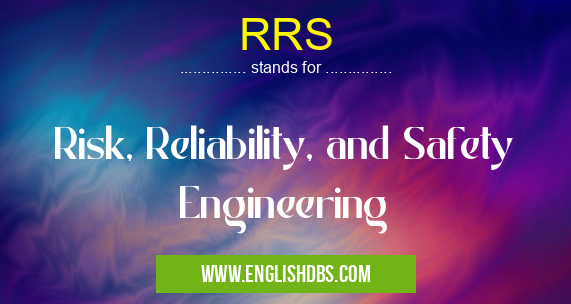What does RRS mean in TRANSPORTATION
The field of Risk, Reliability, and Safety Engineering (RRS) is dedicated to making sure that products and services are designed, implemented, and operated in a safe, reliable manner. RRS professionals focus on identifying potential hazards, analyzing risk factors associated with those hazards, and developing effective methods for mitigating those risks. Through a rigorous process of analysis, testing and preventive measures these professionals ensure that public safety is maintained at an acceptable level.

RRS meaning in Transportation in Governmental
RRS mostly used in an acronym Transportation in Category Governmental that means Risk, Reliability, and Safety Engineering
Shorthand: RRS,
Full Form: Risk, Reliability, and Safety Engineering
For more information of "Risk, Reliability, and Safety Engineering", see the section below.
What RRS Does
Risk, Reliability and Safety Engineering combines multiple components from different engineering disciplines to design processes that reduce the chances of accidents or disasters occurring as a result of human error or product failure. It applies engineering principles to identify potential hazards posed by products or processes in various applications including manufacturing operations, transport vehicle systems and hazardous material operations. RRS professionals then identify risk factors associated with these hazards and develop effective methods for controlling them through system design adjustments or upgrades to existing designs. RRS techniques can range from executing periodic inspections of premises to implementing highly specific protocols for testing the reliability of products prior to release into the marketplace. Additionally, a number of computer-based strategies have been developed over the years to facilitate efficient data analysis related to product safety issues in order to quickly recognize any potential problems before they become widely distributed throughout society.
Essential Questions and Answers on Risk, Reliability, and Safety Engineering in "GOVERNMENTAL»TRANSPORTATION"
What is RRS?
Risk, Reliability, and Safety (RRS) Engineering is the application of engineering principles to ensure the safety and reliability of products, processes, and systems.
What does an RRS engineer do?
An RRS engineer evaluates risk associated with various processes or products by analyzing various scenarios that may lead to accidents or events leading to harm. They also work to design systems that are reliable and safe for users.
What skills do I need to be an RRS Engineer?
To become an RRS Engineer you should possess critical thinking skills, analytical skills, problem solving skills, knowledge of engineering principles and practices, and a familiarity with relevant software tools.
What type of projects can I work on as an RRS Engineer?
As an RRS Engineer you can work on projects related to product safety and reliability analysis, risk mitigation strategies and plans, system safety assessments and investigations, failure analyses of components or assemblies, process hazard analyses, system hazard analyses & identification of risk control measures.
Where can I find employment opportunities in the field of RRS Engineering?
Companies such as Boeing, Lockheed Martin, Rolls-Royce and Toyota are just a few examples of companies which employ RRS Engineers. You can find job openings through job boards like Indeed or LinkedIn or directly from company websites.
How much does an RRS Engineer typically make?
According to Glassdoor the average salary for a Risk & Reliability Engineer is $89K per year in the United States. However this figure can vary depending on factors such as location/seniority/company size etc.
What sort of certifications are helpful while pursuing a career in Risk & Reliability Engineering?
Certifications prove that one has knowledge in certain areas which could be beneficial for employers when making hiring decisions. Some certifications relevant for the field include Certified Reliability Professional (CRP), Certified Quality Systems Auditor (CQSA) etc.
Final Words:
Ultimately the goal of Risk, Reliability and Safety Engineering is simple — create systems that are safe for use by both people and products while still achieving operational objectives in an efficient manner. This requires careful consideration of both technology-related as well as human-centered risks associated with any given system or product so that appropriate steps can be taken to maintain an acceptable level of safety while still achieving optimal performance results.
